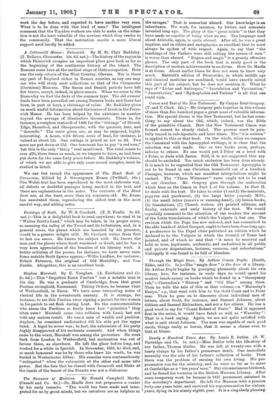The Romance of Medicine. By Ronald Campbell Macfie. (Cassell and
Co. 6s.)—Dr. Macfie does not prepossess a reader by his early remarks. "The world has been made and inter- preted for us by great minds, but we ourselves are as helpless as
the savages." That is somewhat absurd. Our knowledge is an inheritance. We work, for instance, by letters and numerals invented long ago. The glory of the "great minds" is that they have made us capable of being what we are. The language used about Aristotle, again, is quite absurd. After all, he was a great inquirer, and in ethics and metaphysics so excellent that he must always be spoken of with respect. Again, to Bay that "the teachings of the Fathers were still rotting the reason of men" is worse than absurd. "Dogma and magic" is a grossly offensive phrase. The only part of the book that is really good is the description of modern achievements in medicine. Here Dr. Macfie is at home. About earlier times he does not seem to know very much. Mattioli's edition of Dioscorides, in which middle age and classical medicine are combined, would have exactly suited this part of his subject, but he does not mention it. What. he says of "Lister and Antisepsis," "Inoculation and Vaccination," "Anaesthetics," and "Hydrophobia and Pasteur" is all that one could wish.










































 Previous page
Previous page